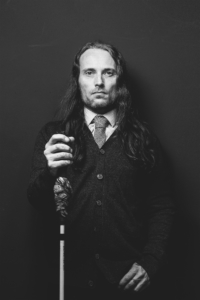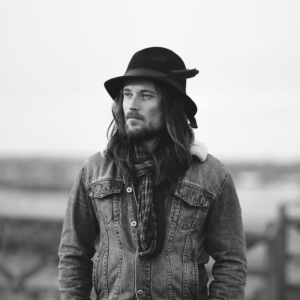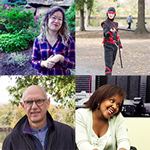Faces Behind the Screen: Ian Treherne
Quick Links
<< Return to all “Faces Behind the Screen” stories
Ian Treherne is a blind photographer from Essex, U.K., a county in southeast England. Since childhood, Ian has always been fascinated with photography. In the mid-2000’s, Ian ventured into professional photography, uniquely capturing the beauty of the world around him.
You can visit Ian’s website to view his full gallery and order prints. If you would like to keep up with Ian’s latest adventures, you can follow him on his social media accounts: Facebook, Twitter, Instagram, YouTube, and Flickr.
Part 1
I believe I was born an artist. The first thing I ever did was draw and sketch with pencils and paper. Just thinking about it, my photography and my drawing are very similar. I enjoy contrast, light, and shadows.
I’ve always been a hands-on person. I had an interest in old film cameras, back when digital cameras didn’t exist. I particularly liked the idea of a mechanical box that could take a picture. It was something that always interested me.
When I was 15 years old I was told that I was going blind. I remember the doctor sitting me down and telling me that I had Usher Syndrome, or Retinitis Pigmentosa Type 2, resulting in severe hearing and vision loss. When I heard the news, I panicked. I told myself that I have to see as many things as possible before it all goes too dark.
I set out with my little camera, which I still have to this day, and I was obsessed with capturing every moment. It wasn’t anything artistic, but they were moments that I wanted to remember. I still have all those photos to this day in a massive box.
That was one aspect of my love for photography, but there are so many other parallel things. I used to look through magazines or walk through art galleries in London and see paintings; it just does something to me that I can’t put into words.
My other informal art education was watching films. I used to go to a video shop and rent a video for a couple of days. I loved spending a Saturday afternoon watching a film. I learned a lot of my compositions through movies. Cinematography and photography are very similar.
Fast forward to the early 00’s. It was still in the early stages of digital photography. I didn’t really get into it until 2009 when I did open mic night. I met a photographer in this quirky pub. I was looking at one of his photos and I realized digital photography got a lot better over the years. His photos looked amazing. From there, a little seed was planted in my mind. I didn’t have a lot of computer skills or knowledge on exposure, but I thought that this was something I could try.
I eventually bought a digital camera and acted like I was a professional photographer. I was being over enthusiastic, but that’s how I learned. I learned through trial and error. I was able to go out there and mess up. Then I would go on Google to ask questions. We live in such a great time where we can just apply ourselves and learn something new. Back in my day, you had to go to university to learn something. Now you can find a tutorial on the internet.
Overtime, I became more confident in my photography skills. Photography has opened up so many doors for me. It’s helped me come out as a blind person. It’s the only thing keeping me connected to the world. I believe it allows me to still interact, but also be on the outside witnessing creativity.
When people find out that I’m a blind photographer, they’re usually a bit baffled and confused. Generally when people ask, I’m more than happy to explain. I remember going on holiday last year. I was walking around with my white cane and my camera. This guy approached me and asked how I was able to take photos while being blind. I explained the situation to him and he understood. I like when people respectfully ask me questions.
I find it harder when people stare and judge. They think that I’m not really blind and that I’m faking it. What I’ve discovered over the past couple of years is that the word “blind” is confusing to some people. They think it’s all or nothing, and that there’s nothing in between. It’s either you’re sighted or completely blind. The bizarre thing is that the people who are totally blind make up a smaller percentage of the blind population as opposed to what I call the “in-betweeners”, who are partially or severely visually impaired.
I sometimes find it frustrating when people are totally incapable of acting normal around blind people. They say that they don’t, but they become awkward around you. I see it all the time from my little tiny window. I see the fear of my cane. Sometimes people will avoid me like the plague like I’m some zombie from The Walking Dead. They see my cane and immediately cross the road just to avoid me.
Blind people are normal people. You get nice people. You get horrible people. You get plump people. You get funny people. You get quiet people. You get loud ones. That’s the same with blind people. We’re all different. We all come in different shapes and sizes.
I sometimes wonder if people act the way they do toward blind people because there isn’t a sighted connection and it causes a barrier. It’s similar with hearing, too. Our sight and hearing are probably the most dominant senses we have in order to communicate. If there’s a sight barrier, then a sighted person may not have any instructions on how to deal with a blind person. I think there needs to be instructions on how to interact with blind people. There have been some amazing YouTubers who make videos about their blindness. I applaud them for getting their message across to people.
If you’re sighted, don’t be afraid of blind people. Just approach us and say hi! Tap us on the arm. Don’t just shout. Just approach us gently. We’re not going to bite!
Part 2
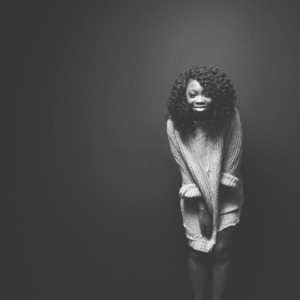
Photo by Ian Treherne
Blindness is generally not what people want to hear. Most people want to hear the more inspiring side of things, which is great. But people don’t really want to hear things like I wish I wasn’t blind or I wish I had full eyesight. Or people would always say, would your photography be like this if you weren’t blind?
The thing is, I would be doing a lot more if I had full eyesight. I hate being blind. I’m very artistic. I’m very enthusiastic. I’m very adventurous. I like being out and about. I love doing things. The last few years, it’s kind of just gone downhill because I’m doing less and less.
I feel like since I’ve started using the white cane, I’ve had to give up even more things because I have to conform to the public’s idea of what a blind person is. I would think, should I be going rock climbing? People sort of question if I should be doing something because I can’t see well.
I’ve stopped myself from doing a lot of things and that’s really made feel down and depressed because I would never have thought that I would allow myself to do that, because I consider myself to be a strong person. I try to push through things and battle the biggest problems and issues.
The last seven years I left my job, lost my driver’s license, was forced into bankruptcy, and had a breakdown. I just feel really defeated at the moment, if I’m really being honest.
I’m just trying to find ways to keep myself going. I’m trying to find ways to break the perceptions of what a blind person is and I’m still trying to figure that out. I don’t really know how to do that. I guess it’s why I’m grateful for my photography because it’s somehow allowed me to bring up the blindness more and talk about it.
I think my biggest thing for me is loneliness. I’ve gone from the kid that was always out on his bike with his friends to having this eye condition that prohibits me from doing things.
I wasn’t prepared for the lasting effects that it was going to give me. In a nutshell, what I’m feeling is probably how retired people feel. You spend all your life working, you get up early every morning, you go to work, and you’re busy. You do that for years and years, and suddenly you stop. And it’s OK for maybe like a week, two weeks, maybe three weeks. But I can tell you after months and years go by, it just ruins you mentally. As human beings, we are meant to be on the go. We are meant to be productive.
I’ve had quite a lot of proud moments if I’m really honest. If I really think about it, it’s all to do with being blind – so I guess that’s where the positive comes from.
“I hadn’t really looked at my work for a long time. And I was like, oh. Man. You’ve taken some nice photos. And I can tell you, I rarely ever said that to myself in my life.”
Well, gosh, there’s so many. But I’ve been an ambassador for Sense. One thing that I was really proud of was when I got an award a couple of years ago. It was a great feeling to be recognized for this mission of changing this whole idea of blind people.
A lot of it has been more quite recent, but even being asked to do a SkyTalk. For me, that just makes me so happy to know that I’m on the right path to be able to talk about this kind of stuff.
Also, having my first exhibition or photographing certain people, which I never ever dreamed would ever happen. And yet it did. When I look at the pictures, I think my god, did that really happen? Was that real?
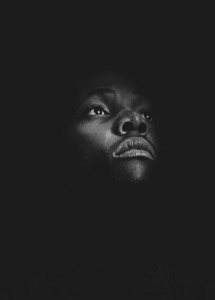
Photo by Ian Treherne
I think a lot of artistic people are very critical of their work, but I can say that I’m really proud of the body of work I created in quite a short span of time – from complete amateur to professional.
Recently when I was working on my new website, I looked through all my work. I hadn’t really looked at my work for a long time. And I was like, oh. Man. You’ve taken some nice photos. And I can tell you, I rarely ever said that to myself in my life, but I can honestly say, it was only a couple months ago, I was like, yeah, I’m bloody proud of myself here. I managed to make all these photoshoots happen. I managed to meet all these people and people said really positive things and seemed to get what I’m all about.
I remember when I photographed an ’80s-’90s vocalist, Lisa Stansfield. I don’t know if she ever was big in America, but she was big in the UK. When I photographed her I was just like, this is a dream! I’ve watched her on TV and she’s super famous and all that kind of stuff. I think I just couldn’t quite believe how this scruffy, long-haired guy somehow managed to find himself working for a film festival or doing portrait jobs or being commissioned.
Overall, I’m happy with what I created artistically. What I’m going to create in the future, I don’t really know just yet. I think it’s going to be more documenting. I’m still doing photography, I’m just not doing as much as I had done in the last six years.
If someone offered me a job at Vogue, I’ll take it. That would be wonderful. I don’t really know what I want– I kind of just go along with the flow, figuring out what to do. Like I said before, since using the cane, I seem to be doing less, but that’s not really the point of it. So I need to figure that out somehow.
Photo by Niki Cornish
Part 3
I’ll be honest, as an older person- I don’t think of myself as old, but I think in technology era terms, I’m older. It’s taken me to be inspired by a younger generation who are using these social platforms to spread the message. I wasn’t doing anything like that.
It takes so much courage the fact that she [Elin Williams] was talking about the white cane saying how she didn’t like to use it and she still finds it a bit awkward, kind of made me feel a bit better. Because I think, my god, it’s not just me that feels like that.
For a long time, I didn’t tell people I was blind. I hid it for so long. It wasn’t that long ago when I started to fully open up. I kind of started a few years ago, but I didn’t really feel that comfortable about it. It’s kind of like losing an identity because you know that once you give your old self up, you are now going to become the “person with the white cane” kind of thing.
It’s a new identity and I’m still transitioning into that. Sometimes I still have moments where I think I don’t need to use the white cane and sometimes I can. This is where I’m confused about this whole idea of what a blind person is. Because I’ve been brought up on that old idea myself and I don’t really feel like we’re in that box.
I’ve noticed along they way that this is team effort here. It’s not going to be just me changing the world. But if I can just be a part of that change, then I’ll be really bloody happy to participate. Like I said, I’m being inspired by the younger generation to start doing things and sort of give me a boot up the backside, really.
I feel like I can get over my battle of being disconnected on a daily basis. If I can change that aspect to my life, it would improve. I’ve noticed that life is about– and it may sound really corny and cliche – but life is literally about connecting with people. You can’t survive life on your own. That’s what I seemed to notice and it has been quite evident.
I was born profoundly deaf. I have an older sister who was born profoundly deaf and also had the same eye condition. But obviously she was diagnosed being profoundly deaf. So when I come along, it was going to be very evident that I will probably have hearing problems, which I did. I kind of got used to it, really. Going up to the hospital, to London, having hearing aids fitted in, being prodded around. I quite enjoyed it, really. Kind of like little gadgets.
I went to a regular school. I had regular friends. I was very fortunate that– and this is probably why I struggled later in life because I wasn’t treated any differently. I already had problems, you know being sort of isolated in the aspect of being left out. I could never really hear the conversations particularly well.
Then in my teens, I was the one that figured out that I had an eye condition in the family. My parents hadn’t even noticed or recognized– my sister hadn’t even recognized anything was wrong.
I figured it out because I was out with my friends riding bikes. We were in the woods and I remember it got dark and I remember thinking, it’s really strange how my friends can see where they are going and I literally can’t see a thing. I remember it. I still remember it. It was complete black. I was so scared, like, so frightened. And I was like, that’s so weird. How come they can see and I can’t? So I asked to be taken to a local optician in my little town.
He told me that I needed to go to the hospital because there was something seriously wrong with my eyes. When they checked my eyes over, he sat me down and said that I had this condition called Retina Pigmentosa and that my eyes would be basically deteriorating from here onwards. I just had this sense of panic and unfortunately, it never got talked about at home.
When we got back home it wasn’t discussed. It was just forgotten about. So that’s kind of how I dealt with it in a lot ways. Well, my mother and father are not talking about it so there’s no point in telling people about it.
So it was only when the doctor told me I was losing my vision that suddenly I realized there was a difference in my eyesight. But to me, I was like, well, I’ve gotten used to this so I was still able to do a lot of things. I went scuba diving. I never told anyone that I had an eye condition then because I felt that if I told anyone that I had an eye condition, they’d say, “oh, well I’m not sure if it’s safe for you to go down there, blah, blah, blah.”
It’s almost like getting permission to do things in life from other people. I know what’s safe and what’s not and I’ve sort of pushed the boat out on a lot of things. But I felt like, hey, I’m only going to live once and I’m losing my eyesight.
The positive of being blind is that it’s going to allow me to connect with a certain type of community of people that I probably wouldn’t have connected with if I wasn’t blind.
Sometimes I think maybe blindness has definitely sculpted me as a person, no question about it. The way I think, how I do things, my love for life, etc. There’s a positive and a negative. And there’s lots of great things in the world. But there’s a lot of awful not so nice things. We’re still evolving. That’s what we’re doing right now. We’re still evolving as human beings. Still figuring it out. I think the probably only positive thing for me about being blind is that if I could do some good with it, then that would be the positive thing for me.
—
Faces Behind the Screen would like to thank Ian Treherne for participating in our storytelling project. If you’re interested in sharing your story with us, fill out our nomination form.
Faces Behind the Screen is a storytelling project focusing on members of the Deaf and hard of hearing community.


